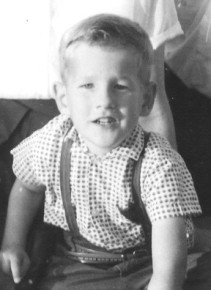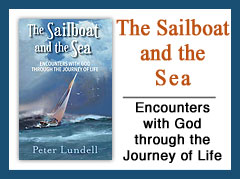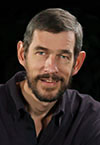Young Life
I don’t know exactly when I started to value eternal issues, but I do know how I started out. My father’s death when I was four seems to have set me in a negative, somewhat angry, view of life—that the most important thing in life gets taken from me. My mother and grandparents loved me and had me in church a lot, so I understood a high God, heaven, and a spiritual world apart from the earthly world we live in. One day my best friend used his new vocabulary on me: “Pete, the difference between you and me is that I’m an optimist, and you’re a pessimist.” I didn’t even know what those two words meant.
I hated junior high, a rough time of life for me, and when I wrote my first short stories, basically fun pieces. I loved senior high, a great time of life, yet from that period I have three surviving short stories—one about an old man who commits suicide, one about a dog that got brutally killed, and one about a little boy who converses with a man who rows out to sea, basically to die, because he can’t stand the awful way the world is. Those stories represented the innate sense I had of the world as a place that lacked both meaning and goodness.
I often joked that my goal in life was to be a hermit in Alaska, and deep inside I meant it. I almost enlisted in the US Navy, except that between aid and scholarships, I got a full ride to college. I graduated from high school as a national merit scholar with a full ride to a prestigious college, was an Eagle Scout, had a gorgeous girlfriend, and the world spread before me. Yet twice I sat with a knife in my hand, wondering why I shouldn’t slit my throat. On one hand I now say I was the stupidest person imaginable. On the other hand I recognize that I intuitively understood the meaninglessness of earthly life–no matter how good it is–as it’s lived apart from God, whom I was angry at for “killing my father.” So I questioned the whole point of living.
College
From my first week as a freshman English major, I started learning all kinds of philosophical points of view that rocked my assumptions about life and gave intellectual expression to the negative side of my intuitions. I grew deeply cynical. My girlfriend, who was still a senior in high school, thought I’d become some kind of alien, and our relation got strained to the point where she had to break up.
I thought people who were happy and smiled all the time were stupid because if they realized all the terrible things that went on in the world, they’d be negative like me. I became somewhat of a party animal. At the bar, my friends and I often quoted the saying, “Eat, drink, and be merry for tomorrow you will die.” Yet I tended to be melancholy and deep in thought most of the time—which is probably why I counterbalanced that by getting drunk a lot. So I understand people who buy too much, drink too much, eat too much, or get addicted to any number of things—in part they’re trying to fill the emptiness inside them, an emptiness they’ve absorbed from the world around them apart from the living God.
In the fall of my senior year, I went to Japan for three reasons: 1) I needed a foreign language to graduate with my English degree, and Latin was boring me to death. 2) I wanted an adventure. 3) I wanted to get away from Christians; I couldn’t stand them. So in Osaka, in my search for ultimate truth in Eastern philosophy and not finding it, I ended up becoming a believer and made a genuine commitment to Christ. There I made the commitment that “God, if you’re real, I want everything you have for me; don’t hold anything back.” That commitment has, through ups and downs, guided my entire life of faith. I didn’t become a true Christian out of repentance or brokenness; I came to faith because I incessantly wanted to know what was ultimately and universally true and meaningful—versus earthly life, values, and supposed truths as they are commonly lived.
After I returned from Japan in the spring of my senior year, I went back to the bars and drinking habit, but now I possessed a new identity that point-after-point felt out of place in my old world and looked to the new hope in Christ I had embraced. I went to a job fair on campus, where representatives of big corporations all basically told me I could make a lot of money. I was totally uninterested in any of them. Only one representative offered me a reason other than making money—the US Navy guy, who said I would serve my country. So for the second time I applied to the navy, this time OCS, but my eyesight wasn’t good enough to be a pilot, so while I thought about it, I was offered a job teaching English in Japan, which I took for more adventure. So I clearly never had much interest in wealth, especially if gaining it were to dominate who I was because I knew it was superficial compared to the most important thing I could do in my earthly life—connect with ultimate truth, ultimate reality—represented in Jesus the Messiah, the manifestation of God Almighty.
Early Adult Life
I thought I might make teaching English a career. But from the beginning I sensed a call from God to go into some kind of full-time ministry. Then as I spent weekends with a missionary couple, I grew more committed to ministry than to teaching. And one day in class I had two Christians—a rarity to have any at all—and I looked at all the other students and thought, If the Bible is true, these other people are not going to make it to heaven. They’ll go to hell whether they speak Japanese or English, so why am I teaching them English? At that point I knew I needed to make a career change.
I thought a good Christian was a missionary, and a missionary needed to go to a poor country. So I went to Haiti, where I felt a call to prepare for a pastoral-type of ministry. At Fuller Seminary I wondered if the amazing biblical ways God worked, and Jesus demonstrated, were real. I met a woman who lived that out more than anyone else I had ever met. Her name was Kim, and we eventually got married. While at Fuller I was profoundly influenced by Vineyard Christian Fellowship and John Wimber. I experienced the fullness of God as I never had before. It was real. And it ruined me for any kind of program-oriented “Churchianity.” I wanted to live the Kingdom of God “on earth as it is in heaven.”
Through a missionary stint in Japan, we lived the power of God for the most amazing year of our lives. On a second stint there, we lived through the hardest years of my life that left me feeling crushed.
Later Years
A twenty-two-year pastorate in Walnut, California, was in many ways wonderful and fulfilling—maturing in ministry, doing pastoral training, starting a writing career, raising a daughter, and living the American dream. But through my own faults and failures, I still lacked the fullness of living out the life-changing presence and power of God in my life. I wanted to experience more of the Kingdom of God beyond what I was doing. Too often I felt spiritually etherized on a comfortable life treadmill. I was connected with God in his fullness, but I was not living it to my full potential.
When Kim got the call to go to Louisiana—of all places on earth—I eventually got the call too. The change has been radical, and with an near-desperate desire, I am growing into a fullness of who I am in Christ. And I have finally—finally—focused all that I do as a pastor, writer, and teacher.
I want to encourage and help you to live your life meaningfully and purposefully, at a higher level than mundane earthly existence (whether rich or poor), and positively influencing the world and people in it—all in the ways that God has uniquely created and will lead you to do so.
Your Life
You have your own life story. How does it play out?
What caused you to be the person you are now?
What leads you to change and grow into the future?
To what is God calling you?
I bless you with the presence and power of God in your life to live beyond your natural self—to deliberately live as a man or woman of God, actively doing your part in the Kingdom of God here on earth, as you anticipate the legacy you will leave, and someday enter face-to-face eternity with God.
Live by God’s Word and Spirit.








